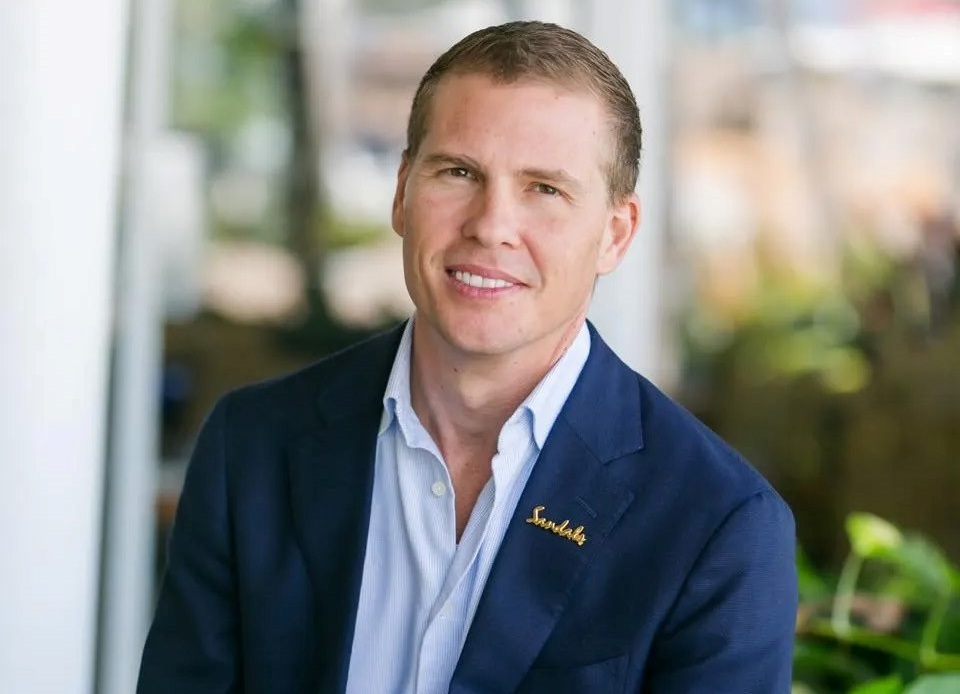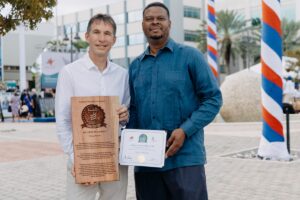Caribbean News
Government Fortifying Jamaica’s Cybersecurity Resilience
Published
9 months agoon

Kingston, Jamaica – The Government is enhancing Jamaica’s cybersecurity resilience through a comprehensive strategy that strengthens prevention, detection, and response capabilities against threats.
Addressing the opening of Guardsman Group of Companies’ Cyber Intelligence Security Operations Centre (SOC) at 14-16 Balmoral Avenue in Kingston on Wednesday (May 14), Prime Minister, Dr. the Most Hon. Andrew Holness, said the Government has made cybersecurity a key initiative in efforts to promote digitalisation and build out digital public infrastructure.
To this end, he said the Government is reviewing and strengthening legislation, including the Cybercrimes Act and the Data Protection Act, to create a legal environment that protects the public and promotes responsible digital innovation.
Additionally, Dr. Holness said investments are being made to train cybersecurity professionals, “because we recognise that technology without talent is ineffective”.
“We understand that digital resilience is national resilience. We are, therefore, very happy to see the opening of the Guardsman Cyber Intelligence Security Operations Centre; it will complement and strengthen the Government’s own framework. Through our National Cybersecurity Strategy and the national Computer Incident Response Team (CIRT), we are building national capacity to prevent, detect and respond to cyberthreats,” he said.
Intelligence Security Operations Centre; it will complement and strengthen the Government’s own framework. Through our National Cybersecurity Strategy and the national Computer Incident Response Team (CIRT), we are building national capacity to prevent, detect and respond to cyberthreats,” he said.
Dr. Holness emphasised that the Centre’s opening signals a transformative shift in the security landscape, strengthening Jamaica’s and the wider region’s resilience against cyberthreats.
“It is a nerve centre that allows for 24/7 monitoring of systems and networks, real-time detection of malicious activity, rapid response to incidents and proactive threat intelligence gathering from across the globe.
“This is about defending ourselves from known risks and also anticipating and neutralising unknown ones. As society becomes more digitalised, we must also develop the culture of digital vigilance where protection is not only reactive, but also strategic,” he stated.
Consequently, Dr. Holness welcomed Guardsman’s focus on cybersecurity awareness training for employees and executives, pointing out that the organisation’s “commitment to education, awareness and workforce development in this field is not only commendable, it’s essential”.
The Prime Minister also highlighted how digital transformation is reshaping every sector, bringing both unparalleled opportunities and significant risks that must be carefully navigated.
“Cyberthreats are growing in scale, frequency and sophistication, targeting everything, from critical infrastructure to privacy. No country is immune, and no sector is untouched. Latin America and the Caribbean has seen the fastest regional growth in reported cyberincidents; about 25 per cent annually since 2013. More than 200 billion attacks or attempts across the region in 2023,” he indicated.
Dr. Holness said Jamaica, like many other countries, has witnessed a rising tide of cyberincidents.
“We recorded 43 million attempted attacks in 2023. We have seen ransomware attacks on businesses, phishing schemes targeting citizens as well as attempted breaches of Government systems,” he informed.
Against this background, Dr. Holness said Guardsman’s Cyber Intelligence Security Operations Centre positions Jamaica and the wider Caribbean, not just as participants in the global digital economy but as front runners in digital security.
“What is particularly impressive is that the SOC is not a replica of a foreign model; it is regionally grounded. Guardsman Cyber Intelligence understands the unique technological, cultural and regulatory conditions of the Caribbean, and it has built a system tailored for those realities,” he stated.
understands the unique technological, cultural and regulatory conditions of the Caribbean, and it has built a system tailored for those realities,” he stated.
“That localisation, paired with global best practices and enterprise grade tools, makes this facility both exceptional and indispensable. The SOC’s capabilities in penetration testing, vulnerability assessment, data protection compliance, forensic analysis and dark web monitoring are world-class,” the Prime Minister added.
Dr. Holness encouraged other private-sector stakeholders to contribute to the continued development of Jamaica’s robust cybersecurity framework, emphasising that the Jamaica Constabulary Force (JCF) will play a key role in Guardsman’s cybersecurity operations.
Guardsman Group’s Executive Chairman, Kenneth Benjamin, said the Centre is the first facility of its kind in Jamaica, “and probably the first in the Caribbean”.
“This milestone reflects our commitment to innovative security solutions. As we evolve to address the growing threats of cyberattacks, this SOC will provide real-time monitoring and rapid response to safeguard Jamaica’s digital landscape. We believe in strong partnerships between private sector and the State [security] forces for a safer Jamaica, and we will remain dedicated to anticipating change and embracing innovations,” he added.
Meanwhile, Deputy Executive Chairman, Nick Benjamin, announced that the company will roll out a series of islandwide initiatives, including drone surveillance, drug-detecting dogs at airports, artificial intelligence integration, and advanced camera overlays.
“This Centre… is a symbol of our commitment to keeping Jamaica safe and secure, not just on the ground but in cyberspace as well,” he said.
CONTACT: CHRIS PATTERSON
RELEASE: JIS
PHOTO CAPTIONS
CAPTIONS:
Header: Prime Minister, Dr. the Most Hon. Andrew Holness (second left), along with Minister of Legal and Constitutional Affairs, Hon. Marlene Malahoo Forte (fifth right), and Executive Chairman, Guardsman Group of Companies, Kenneth Benjamin (fourth left), cuts the ribbon to officially open the Guardsman Cyber Intelligence Security Operations Centre (SOC) at 14-16 Balmoral Avenue in Kingston on Wednesday (May 14). They are joined by Minister of State in the Ministry of Foreign Affairs and Foreign Trade, Hon. Alando Terrelonge (left), employees of Guardsman Group of Companies, and other guests.
1st insert: Prime Minister, Dr. the Most Hon. Andrew Holness (right), greets Executive Chairman, Guardsman Group of Companies, Kenneth Benjamin, on arrival for the official opening of Guardsman Cyber Intelligence Security Operations Centre (SOC) at 14-16 Balmoral Avenue in Kingston on Wednesday (May 14).
2nd insert: Prime Minister, Dr. the Most Hon. Andrew Holness (second left), in discussion with Cybersecurity Analyst, Guardsman Group of Companies, Jacqueline Comrie (seated), during a tour of the company’s security operations centre at 14-16 Balmoral Avenue in Kingston, following the official opening on Wednesday (May 14). Listening (from left) are Executive Chairman, Guardsman Group, Kenneth Benjamin, and Minister of Legal and Constitutional Affairs, Hon. Marlene Malahoo Forte.
Photographer: Yhomo Hutchinson
You may like
-


Jamaica Leaders’ Debate Heats Up ahead of Wednesday’s Nat’l Vote
-


PM Cuts Ribbon for US$1-Billion Harmony Cove Development
-


Montego Bay Moment: CARICOM Leaders Confront Old Challenges, Eye New Alliances
-


CARICOM Zeroes in on Crime Crisis with INTERPOL Support and Renewed Regional Strategy
-


CARICOM Supports Jamaica’s Petition to King Charles on Slavery Reparations
-


Ground Broken For US$81M Port Antonio Bypass
Caribbean News
Adam Stewart named CNW’s Businessman/Philanthropist of the Year for 2025
Published
3 weeks agoon
January 28, 2026
Executive Chairman of Sandals Resorts, Adam Stewart, has been named Businessman/Philanthropist of the Year for 2025 by the regional news publication, Caribbean National Weekly (CNW).
The publication recognised Stewart for his leadership in hospitality, his ongoing investments in regional tourism, his steady crisis response and his philanthropic work throughout what it described as a year filled with both remarkable achievements and significant challenges.
CNW highlighted how 2025 saw industry recognition for Stewart, major announcements of multimillion‑dollar developments across his all‑inclusive luxury resort brands and an invitation to join the prestigious Wall Street Journal CEO Council.
But the publication said his impact extended well beyond business milestones.
“In 2025, the Executive Chairman of Sandals Resorts didn’t just guide his iconic hospitality empire through crisis – he used its scale and influence to help shape Jamaica’s rebound and lay groundwork for future regional growth,” CNW wrote.
The defining moment, it said, came in late October when Hurricane Melissa caused severe damage to parts of Jamaica’s tourism infrastructure. Stewart responded by leading transparent communication with global travel advisors, partners and team members, and made a landmark pledge, that 100 per cent of Sandals and Beaches employees would remain on payroll and receive Christmas bonuses, even at resorts temporarily closed for extensive restoration and upgrades. The company also committed more than US$3 million in staff recovery aid, providing direct support to families affected by the storm.
CNW further highlighted the work of the Sandals Foundation under Stewart’s guidance, noting record levels of community engagement and targeted disaster‑recovery support in healthcare, livelihoods and the environment.
In response to the honour, Stewart said he was “deeply humbled” to receive the Businessman/Philanthropist of the Year recognition and expressed his gratitude to his teams and partners for their dedication during an extraordinary year.
“This award reflects far more than any one individual. It is a direct result of people showing up every day for their communities and believing business is a force for good. It belongs to the extraordinary teams who carry our shared vision forward – especially the Sandals Foundation, whose work continues to create lasting change across education, health care, disaster relief and environmental stewardship,” Stewart stated.
“To every colleague and partner who helps bring this mission to life – thank you for your commitment, heart and belief.”

Flow Cayman recognised for six decades of National Development and Digital Leadership
Miami, FLORIDA (January 27, 2026) — Leading connectivity provider Flow Cayman has been honoured with a National Recognition Award for its role as a ‘Builder of Cayman’.
The award, which was presented by the Government of the Cayman Islands during a ceremony to mark National Heroes Day on January 26, acknowledges Flow’s 60-year partnership in building the communications infrastructure and digital capabilities that underpin national development. Since the introduction of the islands’ earliest telephone services, Flow has continuously invested in both physical and human infrastructure that enable modern life and commerce. Those investments, which range from expansive fibre networks and resilient core infrastructure to the rapid deployment of 5G across the islands, have helped the Cayman Islands compete globally while strengthening services and opportunities at home.
acknowledges Flow’s 60-year partnership in building the communications infrastructure and digital capabilities that underpin national development. Since the introduction of the islands’ earliest telephone services, Flow has continuously invested in both physical and human infrastructure that enable modern life and commerce. Those investments, which range from expansive fibre networks and resilient core infrastructure to the rapid deployment of 5G across the islands, have helped the Cayman Islands compete globally while strengthening services and opportunities at home.
In a historic moment in June 2024, the Cayman Islands became the first territory in the Caribbean to experience 5G connections after Flow officially switched on the first of its 5G-enabled cell towers – a move that ushered in the fifth generation of mobile technology across the islands.
“This national recognition reflects a relationship built on trust, service and purpose,” said Bruno Delhaise, Country Manager, Flow Cayman.
“Our work connects students to education, entrepreneurs to opportunities, clinicians to patients, and governments to their citizens. Being named a ‘Builder of Cayman’ is a profound honour and a reminder of the responsibility we carry to invest in resilient networks, nurture local talent, and create opportunities that uplift our communities.” Flow’s contribution to national development extends beyond connectivity. Through partnerships with government, private sector organisations and community groups, Flow has focused on creating digital pathways for Caymanians including vocational training and apprenticeships that build local careers in technology and engineering, to programmes that help small and medium enterprises trade and scale online, and initiatives that expand household access to the digital economy.
talent, and create opportunities that uplift our communities.” Flow’s contribution to national development extends beyond connectivity. Through partnerships with government, private sector organisations and community groups, Flow has focused on creating digital pathways for Caymanians including vocational training and apprenticeships that build local careers in technology and engineering, to programmes that help small and medium enterprises trade and scale online, and initiatives that expand household access to the digital economy.
“In our evolution from a traditional telco to a technology-first company, our objective is to turn network capability into tangible outcomes for Caymanians,” said Susanna O’Sullivan, VP, North Caribbean, Liberty Caribbean, the operators of Flow and Liberty Business.
“That means faster, more reliable services but also better healthcare access, more resilient public services, safer and more efficient businesses, and expanded economic opportunity for people across the islands. We will honour this recognition by continuing to invest in people, partnerships and programmes that deliver measurable social and economic value.” O’Sullivan also paid tribute to Flow’s local team in the Cayman Islands. “Thank you to everyone at Flow Cayman and beyond for the role you play in making moments like this possible. We take great pride in this recognition, and it inspires us to keep building and connecting the communities we serve.”
businesses, and expanded economic opportunity for people across the islands. We will honour this recognition by continuing to invest in people, partnerships and programmes that deliver measurable social and economic value.” O’Sullivan also paid tribute to Flow’s local team in the Cayman Islands. “Thank you to everyone at Flow Cayman and beyond for the role you play in making moments like this possible. We take great pride in this recognition, and it inspires us to keep building and connecting the communities we serve.”
Caribbean News
Seven Days. Seven Nations. One Storm — Hurricane Melissa
Published
4 months agoon
November 1, 2025
A week of wind, water, and heartbreak
From Haiti’s hillsides to Bermuda’s reefs, seven Caribbean nations have been battered, bruised, and forever marked by Hurricane Melissa — a storm that tested not only the region’s infrastructure but its unshakable spirit of unity.
Saturday–Sunday, October 25–26 – The First Strike: Hispaniola
Before the storm even earned its name, torrential rain and flash floods swept across Haiti and the Dominican Republic, claiming lives and tearing through rural communities.
tearing through rural communities.
In southern Haiti, rivers burst their banks, swallowing roads and homes; 23 people were confirmed dead by Sunday evening. Across the border, one death was reported in the Dominican Republic as swollen rivers cut off villages in Barahona and Pedernales.
By nightfall, the tropical system had strengthened — and the Caribbean knew it was facing something historic.
Monday, October 27 – Evacuations and Airlifts
In The Bahamas, Prime Minister Philip Davis issued a mandatory evacuation for the MICAL Islands — Mayaguana, Inagua, Crooked Island, Acklins, Long Cay, and Ragged Island.
Bahamasair added extra flights as the nation braced for what forecasters warned could become the strongest storm in nearly two decades.
Meanwhile, Jamaica, Turks & Caicos, and Cuba activated their national emergency operations centers.
Tuesday, October 28 – Jamaica and Haiti Hit Hard
By afternoon, Hurricane Melissa made landfall near St Elizabeth, Jamaica, as a Category 5 hurricane — winds of 185 mph, central pressure 892 mb, the lowest ever recorded so close to the island.
Roads collapsed, bridges washed away, and Black River Hospital lost its roof. Power failed for 72 percent of the island.
BOJ TV footage shows split asphalt, sparking lines, and flooded communities abandoned for safety.
Initially four were reported dead, that grew to seven deaths and heavy damage in 170 communities; Andrew Holness, Jamaican Prime Minister calling it “a national test of resilience.”
Haiti, still recovering from the weekend’s flooding, was hit again as outer bands dumped more rain on Les Cayes and Jacmel, deepening the humanitarian crisis.
Wednesday, October 29 – Crossing to Cuba
Weakened slightly to Category 4 (145 mph), Melissa tracked north-northeast at 8 mph, hammering eastern Cuba with hurricane-force winds
and mudslides. Over 15 000 people were evacuated from Santiago de Cuba and Holguín.
In Turks & Caicos, the Regiment deployed to Grand Turk, Salt Cay, South, North and Middle Caicos, preparing shelters and securing public buildings.
Thursday, October 30 – The Bahamas and the All Clear
Melissa’s speed increased, sparing the northern Caribbean its worst.
The Bahamas Airport Authority closed 13 airports from Mayaguana to Exuma International; none reported casualties, though infrastructure suffered.
In Turks & Caicos, the all-clear came early Thursday after minimal impact. Premier Washington Misick expressed gratitude and pledged support for neighbors:
“We must act — not only with words, but with compassion and deeds.”
Friday, October 31 – Counting the Cost
By Friday, Melissa had weakened to Category 3 (120 mph) north of Cuba.
The Bahamas Department of Meteorology issued its final alert, lifting warnings for the southern islands.
Regional toll:
- Haiti: 23 dead, thousands displaced.
- Jamaica: 7 dead, 170 communities damaged; 72% without electricity
- Cuba: 2 dead, 15, 000 evacuated.
- Dominican Republic: 1 dead, flooding in southwest.
- Bahamas: 0 dead, minor infrastructure damage and flooding in southeast.
- Turks & Caicos: minimal to no impact.
Relief and Reconnection
The Cayman Islands became the first government to touch down in Jamaica post-storm. Premier Juliana O’Connor-Connolly led a contingent bringing a plane-load of essentials and pledged US $1.2 million in aid.
Reggae icon Shaggy arrived on a private jet with friends, delivering food, medical kits, and hygiene supplies.
Meanwhile, Starlink and FLOW Jamaica activated emergency satellite internet across Jamaica providing free connectivity through November.
From overseas, U.S. President Donald Trump, speaking during his Asia tour, announced that American search-and-rescue teams and disaster aid will support the region.
“They can depend on U.S. assistance as they recover from this historic storm,” he said.
Faith, Funds, and False Websites
The Government of Jamaica and the Sandals Foundation have both launched verified donation portals for recovery. Officials are warning against fake crowdfunding pages posing as relief sites and urging donors to use only official channels.
A Seventh Nation in the Crosshairs – Bermuda
As Hurricane Melissa left the Caribbean basin, Bermuda found itself next in line.
Forecasts indicated the storm would pass just west of the island late Thursday into Friday, likely as a Category 1 to 2 hurricane with sustained winds near 105 mph.
Though far weaker than when it ravaged Jamaica, officials issued a hurricane warning, urging residents to secure property and expect tropical-storm conditions.
By all appearances Bermuda is heeding the warnings
The Human Response
Across the Caribbean, solidarity surged.
The Global Empowerment Mission (GEM) in Miami began airlifting relief supplies, while churches, civic groups, and businesses in The Bahamas and Turks & Caicos organized drives for displaced families.
“Your dedication gave our islands the strength to face the storm,” Premier Misick said. “Together, as one Caribbean family, we will rise stronger.”
Resilience in the Wake
Melissa’s winds may have faded, but her impact endures. Engineers are inspecting bridges, hillsides, and water systems; volunteers are clearing debris and distributing aid in communities still cut off.
From Haiti’s ravaged river valleys to Jamaica’s sugar towns, from Cuba’s eastern hills to The Bahamas’ salt ponds and Bermuda’s reefs, the region once again stands at the crossroads of ruin and renewal — and leans, as always, toward hope and a faithful God
TRENDING
-

 News3 days ago
News3 days agoThe Department of Trade, Industry & Fair Competition to Host Export Readiness Workshop Under the theme “Empowering TCI Businesses for Local Growth and Global Markets.”
-

 TCI News5 days ago
TCI News5 days agoExperience Turks and Caicos and Aquila Host Product Development Workshops to Strengthen Sister Islands Tourism






